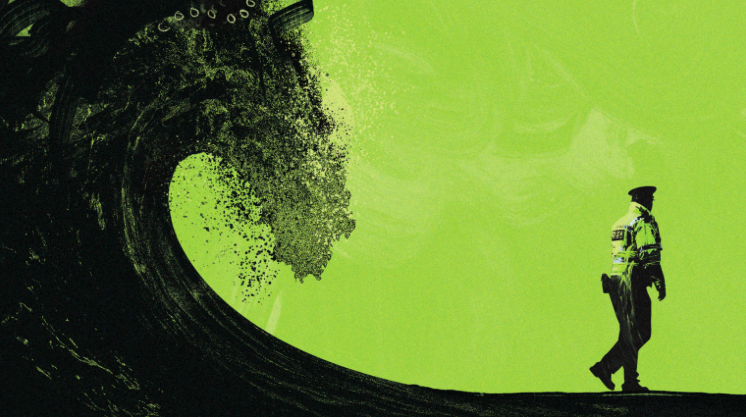
I sit here pondering on the life I had. For 11 years I served as a police officer in Britain, firstly in Manchester and then in London. After my experiences of racism and homophobia in the force, and falling ill with depression because of them, I was forced out of my job as a detective. My life fell apart.
Not only did I lose my career, home and marriage, which crumbled under the weight of everything else, but I had to survive on benefits and live in a shared dorm hostel for over two years. A former Clerkenwell courthouse, Clink78 is a 600-bed hostel in central London. It uses former prison cells as bedrooms and is next to a police station. The irony was not lost on me.
After enduring horrendous discrimination in the workplace because of my race and sexuality, it felt like I had been sentenced for a crime I did not do. I shared a room with 13 other beds that were occupied by different people every night. There were no curtains and no privacy. I cried myself to sleep often. That’s my lived experience, but I know I am not alone.
Many before me have known such devastation, and millions in Britain today are just one paycheck away from losing their homes and livelihood. Over 300,000 are homeless in the United Kingdom. Between October 2017 and March 2019, 800 homeless people died, many in avoidable deaths. One in four people suffer from a mental health condition.
My physical and mental health plummeted following my experiences in the police. Some friends abandoned me, I abandoned others, and I no longer saw my family. I was completely devastated. I just didn’t feel at home in this world. Yet my experiences are not unique.
Like many, I wanted to quit life but life didn’t want to quit me. But what do you do after you’ve lost everything, including yourself? With the publication of my first book, Forced Out, that’s the journey I’m now on. Trying to rebuild a life after devastation and loss. But in order to heal, I have to mourn the past so that I can move forward. For this, I have to go back to the beginning and look at the choices I made, and why I made them. Why did a working-class black gay man from Liverpool think it a good idea to join the police force?
During my police service, I saw great poverty and witnessed awful housing conditions as I went about my duties, reminding me of the place I came from. I saw how arresting ‘beggars’ was seen as a waste of time by the police leaders because nobody cared about them. The homeless were picked on and moved on, hopefully to a new patch.
I was born in Liverpool, the last of 11 children. Raised single-handily by a devoted white mother, as a young brown boy life was good. I loved it. Though we didn’t have much, we were loved. There was a real community spirit on the Falkner housing estate, with regular street parties to celebrate national occasions. The estate was the backdrop to a very happy, fulfilled childhood. But Toxteth, one of Britain’s most deprived urban areas, had had its fair share of problems. It saw some of the worst urban riots anywhere in the world during the 20th century. It had been over-policed and criminalised by the force. My community faced prejudice, hostility and misdirected anger.
I lived through the impact of the Hillsborough football disaster on my city, following the death of 96 Liverpool supporters, and 766 injured. The year before I was due to leave secondary school, Stephen Lawrence, a black teenager not much older than myself, was murdered in London by white racists. The police were found to be at fault in both these tragedies. These had left an impression on me, and yet I still wanted to join the force.
From training with Greater Manchester Police and following my transfer to London’s Metropolitan Police, racism and homophobia blighted my career. After becoming ill as a result, I challenged the police in the courts. It was a horrible experience with the police being found guilty of racism and homophobia towards me because of the colour of my skin and sexuality. I was then forced out. The end of my police career after a decade didn’t come as a surprise, it had been something that was building up for some time after I became unwell following my experiences. But what was a surprise was everything afterwards hitting me all at once. It was loss after loss after loss. It’s these I’m now trying to come to terms with so that I can move on from the past once and for all. To start over and rebuild.
Published by The Big Issue on 11 August 2020.